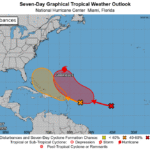He’s a previously convicted Haiti drug trafficker with contacts in Colombia and Venezuela who operated in the shadows to move drug loads from South America to the island of Hispaniola, shared by Haiti and the Dominican Republic, and then to the United States.
On Thursday, more than three years after his extradition from Haiti to the U.S., Jean Eliobert Jasme, who goes by the names “Eddy One,” “ED1,” and “Tio Loco,” was sentenced to nine years in federal prison, according to an announcement from Richard G. Frohling, acting United States attorney for the Eastern District of Wisconsin, where the case was prosecuted.
Jasme was also sentenced to four years of supervised release and fined $1 million after having pleaded guilty to conspiring to distribute 500 grams or more of cocaine intended for the U.S. The case was prosecuted by assistant United States Attorneys Robert J. Brady, Jr. and Gail J. Hoffman of the Eastern District of Wisconsin.
Known as a facilitator with access to his own airplanes, Jasme wasn’t just well known in Colombian cocaine drug trafficking circles. He was also a known figure in the files of the U.S. Drug Enforcement Administration, where he had been one of the most-wanted Caribbean drug smugglers before he pleaded guilty in 2004 in a Miami federal court to two counts of conspiring to import cocaine into the U.S.
At the time of his first guilty plea, Jasme, then 42-years old, agreed to help U.S. prosecutors investigating cocaine corruption in the administration of former Haitian President Jean-Bertrand Aristide.
This time around, Jasme, 63, hasn’t been as cooperative, a source familiar with his prosecution said. Court records show a last-minute attempt by Jasme earlier this month to take back his guilty plea.
In a letter to the court, he claimed that he was denied “effective assistance” of counsel in violation of his rights. He also said he was given “misinformation” about the immigration consequences of his guilty plea. He has been left blind in his left eye, Jasme said, claiming it was due to medical neglect while in U.S. custody, and said being sent back to Haiti would be detrimental to his health.. Foreign nationals are usually deported back to their home country after serving their prison sentence, even when given supervised release.
Jasme’s arrest was the last major bust by the DEA’s country office in Haiti, which until then had struggled to make major drug trafficking arrests amid a whistleblower scandal about alleged corruption in it ranks in Port-au-Prince after the office bungled a April 2015 drug smuggling bust on a sugar boat. The Haiti DEA office’s investigation showed that Jasme had contacts in both the national police and among armed groups operating in the Tabarre suburb of metropolitan Port-au-Prince. He’s accused of using those ties to move cocaine, some of which were traced to Milwaukee, which led to the case being prosecuted in the midwest. According to court documents, between February 2019 and March 2022 Jasme arranged to smuggle large quantities of cocaine along routes that led through Colombia, Venezuela, the Dominican Republic, The Bahamas and Haiti.
“Jasme had personnel, planes and boats readily available to move cocaine along these routes,” prosecutors said in a press release.
For his services, Jasme charged a commission between 25% and 30% of the cocaine load. In early 2022, Jasme was arranging the shipment of over 8,800 pounds of cocaine from Colombia to The Bahamas through Haiti using a Beechcraft King Air C90 aircraft. In a message to his Colombian cocaine broker, Jasme said:
“You know, 4000 [kilograms] is nothing, brother. I can schedule that on the C90, 500 [kilograms] per trip, two trips a week without any headaches. In four weeks, we have 4,000 [kilograms] here [i.e., Haiti]….I have people who are waiting for work, who are waiting for food [i.e., cocaine]. Big people who are buying for 500 [kilograms], 400 [kilograms], buying a thousand [kilograms], so you know.”
DEA agents in Haiti intervened before Jasme completed the shipment. He was arrested by Haitian police in March 2022 along with a co-conspirator in the Haiti National Police. He was ultimately sent to the U.S. to face prosecution, where at one point the case was stalled before it was revived with his guilty plea.
By JACQUELINE CHARLES/Miami Herald



